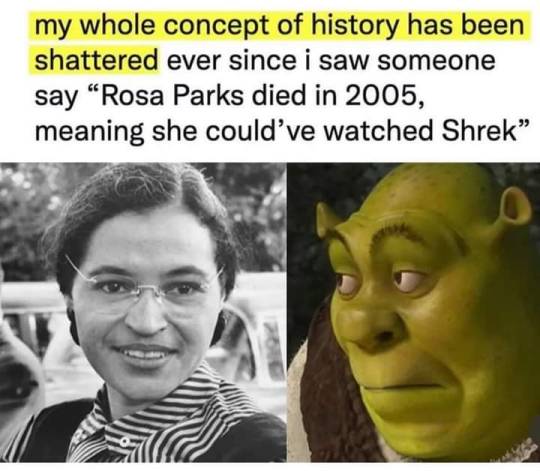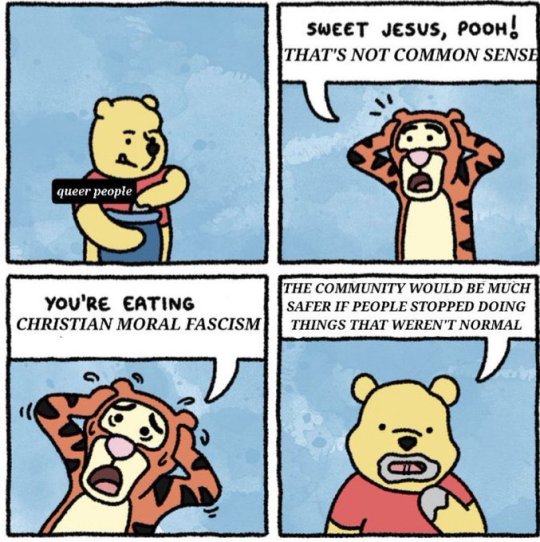"Oh Good God! Consider yourself lucky that you have EvilElitest to abuse, for no sane man would tolerate it" Welcome to My platform, a "Rolling Stormcloud of the Mind" A historian on a mission to civilize. Also I have a Patreon, evidently I should advertise it like a grownup https://www.patreon.com/EvilElitest
Don't wanna be here? Send us removal request.
Note
Stalin signed Molotov-Ribbentrop after begging the UK and France to take Hitler serious and form a military alliance against him. They refused and so Stalin was left to face him alone, so he cut this neutrality bargain to win time to ramp up military capacity.
If your solution to people not helping you fight fascist is to actively help the fascists invade poland, that makes you a fascist collaberator. Stalin didn't have to provide Hitler with the oil that fueled his war machine, he did that of his own free will
3 notes
·
View notes
Text
Of course they are dismissive of there own allies
8 notes
·
View notes
Text
Some people really struggle with self awareness

king
118K notes
·
View notes
Text
Russian-Ukraine War Part 4: The Birth of Russia
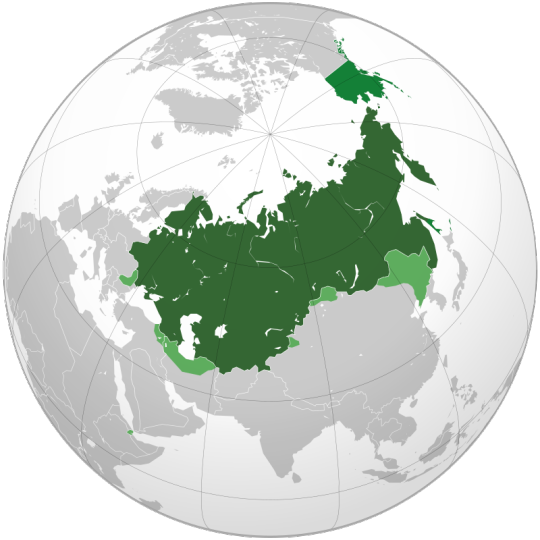
So Russia is big. It's like one of their defining traits, vodka, art, brutality, colonialism, communism, and being massive. But did you know that once Russia was once…not so big? Let's do some history.
So the Mongolian Empire was a brutal genocidal engine of conquest but if you survived the initial invasion, it wasn’t so bad by the standard of brutal imperialists, the Mongols were big on religious tolerance, cultural integration and above all trade. So the Russians found themselves suddenly connected to Central and East Asia through their Mongol overlords, and Russia for the first time in Russian history, it is as connected to East Asia as it is to Europe.
The Mongolian Empire was great at conquest but struggled a lot with the ruling, and it probably won’t surprise you that it broke into 4 smaller states shortly after the death of Genghis Khan, located in the Middle East, China, Mongolia and Russia Respectively. The one that concerns us is the Golden Hoard, the Russian based Mongolian state, who were called “Tatars” by the locals.
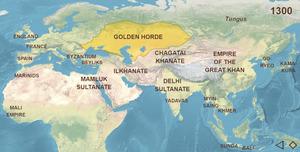
The Golden Hoard wasn’t an Empire that spent most of their time breathing down your neck and setting major policies in their capital, instead they ruled indirectly via tributary states. They would basically allow your kingdom to exist and kinda do its own thing as long as you paid your taxes, and one special boy kingdom was allowed the honor of collecting the taxes. The special boy of our story is the Grand Duchy of Moscow, which will overtime be upgraded to the Principality of Moscow, to the Grand Principality of Moscow as they steadily get more and more powerful, using the privileges they got as the Mongol’s special boys to eventually grow their military and economy.
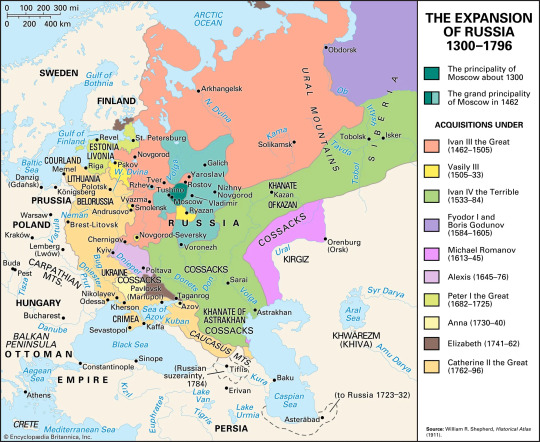
Eventually they were able to push back the Mongols (assisted by the Golden Hordes constant civil wars), and by the time of Ivan the III aka Ivan the Great, the state was independent and a massive nation. Ivan III is kinda seen as the first independent Ruler of Russia, where Russia exists in its own right and not just as a Mongolian Tributary state. Ivan’s grandson, Ivan the IV, aka Ivan the Vasilyevich, aka Ivan Grozny, aka Ivan the Terrible eventually decided that the Title of Grand Prince wasn’t quite good enough and so it was he who formally turned the state into an Empire, giving himself the title of Tsar, after brutally conquering all the people around him. And so the Russian Empire was born between Ivan the Great and Ivan the Terrible, go figure.
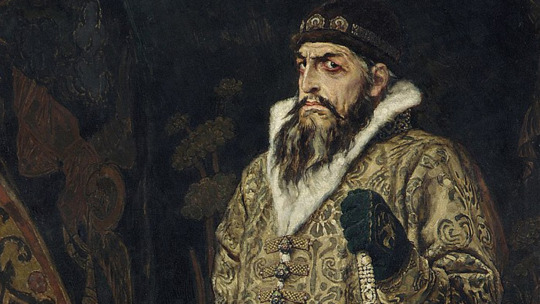
(Ivan the Terrible, Very stable man)
So Ok, Russia is an independent Empire, but under Ivan the IV it becomes more than that, it becomes the Orthodox State. Let me walk back a bit. Christianity first super huge split was in 1054, where the Eastern Greek Speaking Orthodox Church broke apart from the Western Latin Speaking Roman Catholic Church. The Catholics have the Pope, who manage to establish himself as a religious power greater than even Kings, while the east had the Patriarch, whose power was limited by the Emperor? What Emperor you say? Well time to talk about the Byzantine Emperor
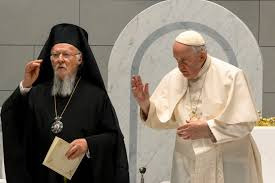
Patriarch (left) Pope (right)
So the Byzantines are the dominant supreme cultural power of the East right? Well by the time of the Mongols, not so much. The great city of Constantinople was sacked in 1204 by the 4th Crusade, in one of the greatest own goals in history, and the Empire was in a state of decline ever since. And I mean actual decline, not Edward Gibbon (your decline is almost a thousand years) decline, which was pretty upsetting for the Rus, the other great Orthodox power (Ok I see you Bulgaria and Romania, you’ll get your own episodes another time calm down), and as Byzantine declined, Muscovy keep taking on more and more of the role as “big Orthodox power of the east”. But the striking blow came when Constantinople fell in 1453 to the Ottoman Empire under Mehmed the II aka Mehmed the Conqueror, bringing a final end to the Byzantine empire…ok there were a few splinter states but Mehmet gets them 20 years later so once and for all Byzantines are gone.
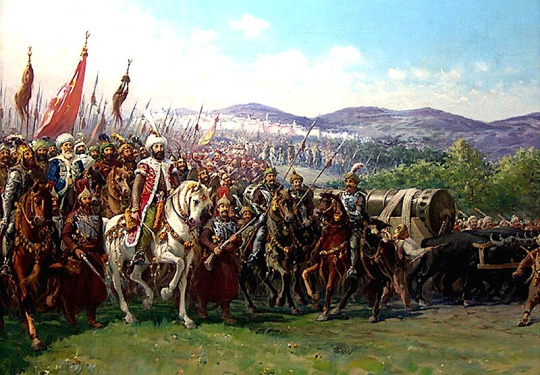
(Mehmet II preparing to destroy Byzantinium)
SO I cannot empathizes enough how much of a blow this is to the Orthidox World. The Byzantine Empire was THE Orthidox power for over a thousand years, it was the center of the Orthidox world.Consantinople had been the center of the Orthodox church since Constantine himself, it's like Rome turning Muslim or Mecca Christian, like this is a theological crisis. However, the Grand Principality of Moscow was eager to take on the role of center of the Orthodox Church, and Ivan the Great started to call Moscow “The Third Rome” to succeed the Byzantines as the Byzantines had “succeed” the Romans (despite being Roman…look i never said it is smart). This is why Russia’s coat of Arms is the two headed eagle of the Byzantines. His grandson Ivan Grozny unified the Principality into a strong centralized autocratic state through the power of brutal oppression and secret police, creating the Russian Empire. Later the Patriarch would relocate there, effectively the closest thing to the head of the Orthodox church, making Moscow the new center of the Orthodox faith.

As the "Third Rome" Russia wasn't just an Empire, it had a divine mandate to take territory and spread the Orthidox Faith. The notion of this Russian style Manifest Destiny is going to come up again in this series, and it has never completely left the Russian National identiy.
Ivan took the title of Tsar which means Caesar as in Emperor. As an Empire rather than a Principality, the “Divine Mandate” of Russia became to serve as the protector of the Orthodox Church, to reunify the old Kievan Rus, and restore Constantinople. Like most empires, including the Mongol, the Russian Empire is based on the notion that they have a divine right to rule over everybody else. This dream was put aside for the Time of Troubles, a civil war so horrific that it makes Game of Thrones look peaceful, but after that confusion Russia was ready to go (this is where the Royal family goes from Ruik to Romanov) This is not going to be an extensive look at all of Tsarist Russia, just the stuff which I think is important to understand for Ukraine. Colonization, the Tsar and Serfdom.
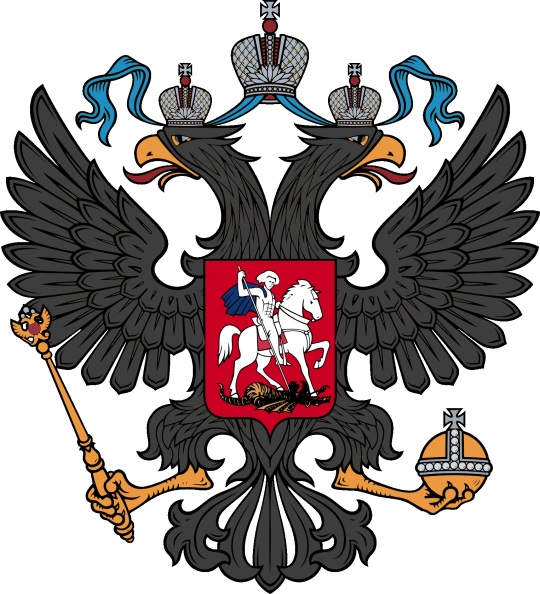
#Neglected Historical Fact#Russian History#Ukranian History#Russia#Ukraine#Golden Hoard#Mongolian Empire#Byzantine Empire#Orthidox CHurch#Great Schism#Ivan III#ivan the terrible#Ivan the Great#Third Rome#Tsar#Imperial Russia#Time of Troubles
8 notes
·
View notes
Note
There seems to be a growing idea that the Soviet Union was not really communist (not new) but that the best way to understand it is to view it as "The People's" Russian Empire.
Which is to say it acted just like any other imperial state, but branded itself as communist through its propaganda and some of its social programs that were largely secondary to military conquest. Thoughts?
This is a fantastic question and my answer is "mostly yes". outside rhetoric, in most respects the Soviet Union inhereted the Imperial ambitions of the Russian Empire, just making Moscow rather than St. Petersburg the center of administrative control. Hyper centralized state, minority communities being constantly moved against their will, regional cultures being wiped out, the border states serving to provide the center with resources and security, in terms of actual practice the Soviet Union is effectively an empire just using a different justification and rhetorical style.
That being said there is one key difference between the two, the Soviet Union as a communist state, preached racial equality. Now that Soviet Union was a deeply racist state with multiple genocides under its belt, but because it was founded on communist principles, it never had an offical "superiort Ethnicity" the way that the Russian Empire did, and so the various ethnicy minorities within the USSR always had access to power if they toed the party line. For example, Stalin was an antisemite how would eventually engage in an antisemetic purge, but Jewish peopel were able to rise to very high ranks within the Soviet administration. Georgia was actively persecuted by both Imperial Russia and the Soviet Union but in the latter the dictator and the head of the secret police were both Georgians. You would never have that in Imperial Russia, where the highest ranks were reserved for Russian nationals only. The Soviet Union was always willing to accept individuals to very high ranks if they toed the party line, which is kinda unique in terms of Empires.
5 notes
·
View notes
Text
Ukraine Russia ConflictPart three, the Kievan Rus
Ok so where did this conflict start? To understand that, we need to go back to the 9th century, where records are short, legends are long, and nationalists search the seas for mythological times to pine back too. Welcome to Kievan Rus, aka Ruthenian, aka Svitjod the Great, aka Svitjod the Cold, aka “The place where Russian and Ukraine both trace their origins to this point.
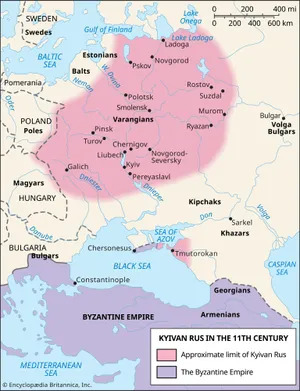
If anything, this map makes things too clean
But before we talk about the Rus, we need to talk about “Periodization”. Periodization is one of the most important concepts about being a historian, it's the dividing the past into distinct parts so it can be easier to understand. If you’ve ever studied Japanese History and are looking at the “Edo Period” or the ‘Showa Period” that's periodization, it's cutting up the past into distinct units. Periodization is in many ways necessary to understand the past, you can’t study all of it or you will go mad, but it can create these divisions in time which don’t necessarily exist naturally. A great example of this is the Early Modern Period, which historians use to highlight the development of the trends that will eventually emerge into the modern world. The slow rise of capitalism, the slow death of feudalism (except in Russia), the downfall of the hegemony of the Catholic Church, the start of mass media, the first movements towards industrialization, the rise of the first global colonial empire and the creation of modern states. It’s a very useful framework to understand the changes that happened in the 16th, 17th, and 18th centuries. However, if you are a random Hanoverian peasant, as far as you know, there isn’t any difference between 1491 and 1492. Time periods are useful but they aren’t ironclad things, like money, it's an illusion, just a functional and useful illusion.
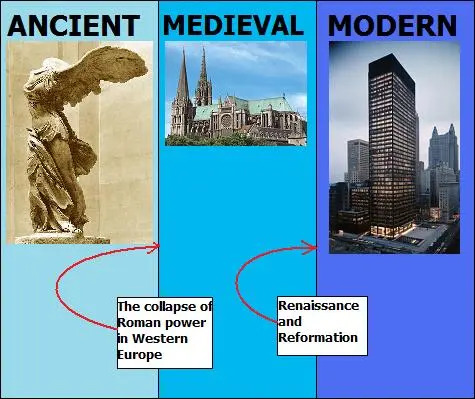
nice and simple
The reason why that tangent mattered is that when it comes to what is called “National History”. So you have a nation right, a whole new cool nation. How do you make sure everybody is part of this nation? Oh well you have public schools and in those public schools you have textbooks which teach the history of your country, how neat is that? So..where do you start? History is long and it can be difficult to teach. Like if the US finally got a national history curriculum, where would you start? People have lived in the lands of the United states since at least 10,000 BCE, do we start there? Do we start with the first European arrival in the colonies? These aren’t neat or easy to answer questions, debates over “where do we start our history” can get really intense. A lot of French history books will teach the Gauls to be like ���look, these are our ancestors” but there is literally a thousand years separating the conquest of Gaul from the Emergence of France.

Utterly uncomplicated in every way
Periodization matters for our purposes because both Ukraine and Russia point to the Kevian Rus as “the start of their civilization.” and while the events of the late 9th century shouldn’t be affecting us today, apparently it does.
Another note is that the Kevian Rus is a bit hard to document due to the fact that the people didn’t have a writing system, so what we know comes from archaeological evidence and outside sources, so the make up and borders of this region is a bit hard to define with certainty but fuck it lets go.
The Kievan Rus consisted of most of central and eastern Ukraine, Belarus, and the western chunk of Russia, and as the name implies it was based in Kiev, what is today the capital of Ukraine, though it wasn’t known as the Kievan Rus at the time, it was called the land of the Rus (due to the ruling Rurik dynasty) or just “Rus''. The earliest version of the word Russia refers to the eastern half of the Kievan Rus, while the western half (what is today Ukraine) was known as Ruthenia. Since its origins are the stuff of legend, it might have been founded by Norse traders, or Norse people were invited to rule, or a bunch of Vikings settled peacefully in the area, it's a huge flame war among nationalists that isn’t relevant other than to show how much people still care about this area. The Rus was a major trade network in the area and it was more of a loose confederation of city states rather than a strong centralized empire.
Most relevant to our story is there relationship to the Byzantine Empire

Byzantium at its largest extent
TANGENT TIME. The Byzantine Empire was never called that during their time, they always thought of themselves as the Roman Empire. When Constantine the Great converted the Empire to Christianity, he moved the capital to the new city of Constantinople (famously the modern city of Istanbul). A century or so later, the empire split into East and West, with the East being seen as the greater and more powerful of the two. The Western Roman Empire fell in 476 AD, the east just…kept on going until 1453. No I’m not kidding, this matters for understanding Ukraine, those Zelensky memes were created in the legacy of Justinian the Great, keep watching. As mentioned earlier, Western Empire goes Catholic, the Eastern goes Orthodox, and after the west falls, the Eastern Roman Empire keeps on going. We call it the Byzantine Empire for…complicated reasons I might explore some day. Anyways, by the time of the Kevian Rus, the Byzantines are the supreme cultural, military and most importantly economic power of Eastern Europe, and the Rus are basically massive fucking simps for them. Like “please notice me Patriarch senpai '' simps. They even played a major role in the Varangian Guard, the personal bodyguards of the Byzantine Emperor.

The Rus were pagan at the time, a mix of the norse pantheon and the Slavic pantheon (pagan religion is complicated and deeply synthetic, I might talk about that in another post), but due to its location it always had Christian, Jewish and Muslim minorities, but it should come as no surprise that in 988 Volodymyr the I or Vladimir the Great converted the kingdom to Christianity, and due his taking a Byzantine bride and thus marrying into the Imperial family, it was of course Orthodox Christainity, thus starting over a thousand years of Orthodoxy in the region. Anyways, eventually all good things came to an end and by the 12th century it suffered the weaknesses of feudal confederacy (succession crisis) and had largely broken apart in all but name, as local feudal lords sort of went their own way. This is where the Russian/Ukrainian split first sort of not really occurs, the informal overall Rus still exist but you get these smaller Rus within it, the Novgorod Rus, the Moscow Rus, the Vladimir Rus. But the distinction between the various Rus comes to matter less than you’d expect because suddenly…MONGOLS

I really can’t empathize enough how big of a deal the Mongols were on the world stage, and probably one of the few legitimate examples of the Great Man theory of history proving true. Temujin’s abandonment issues eventually result in an empire which destroys the Status Quo of the Eurasian world, and leads to the largest continental empire in history. In the Mid 13th century, Temujin, later known as Chiggis Khan (Ghengis Khan to the West) would create the most terrifying military machine in history to that point, which would wipe out whole civilizations. So suddenly all these Mongols show up and wipe out…basically everything. The Rus? Gone. The Civilization that originated both Russia and Ukraine is now definitely gone for good. The Mongols keep the East, which becomes part of the “Golden Hoard”, while the west reforms as the Galician-Volhynian Principality, and eventually gets eaten by Poland and Lithuanian.
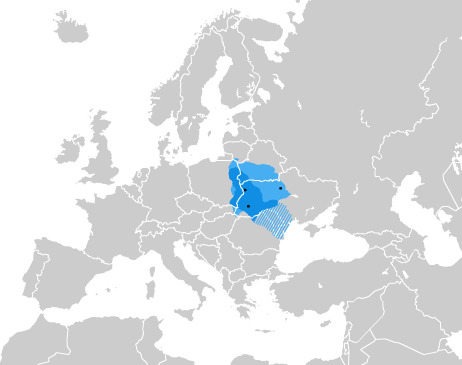
Now there have been entire series of books written about the culture, political structure and history of the Kievan Rus but what matters to us is its legacy in the historical memory of Slavic nationalists, the Rus is considered the origin point of both Russia and Ukraine, and many Russian nationalists feel that Kiev is there birthright.�� For Americans, this can be a bit hard to imagine because the US has never lost major territory in its history but imagine if Pennsylvania became an independent nation, and now we have all these places of national significance in another country. Hell we can take this further, Imagine if the East Coast became independent, and Texas history books talk about the founding of the US, but all of the places where the US was created are now outside there territory. Now that isn’t a justification, “oh my ancestors once lived there so I get to invade’ is stupid. Also the later Principality of Moscow and the Princedom of Galicia-Volhynia will each claim to be the “true” heir to the Rus, in a manner very similar to the Holy Roman Empire actually. This isn’t the only thing causing the conflict, but nationalist fanfiction about the origin of the Slavs still plays a major role in modern politics. This also is a big part of why Russian nationalists don’t consider Ukraine a thing, to them Ukraine is just a different part of Russia with funny accents, not their own nation with their own history. The Russian conquest of Ukraine (the first one) was presented as a reclaiming of traditional Russian land, not the taking of a foreign land.
Next time, Russian history, because nothing says “I’m going to explain the conflict in Ukraine” like spending most of it on Russia.
#neglected historical fact#Russia#Ukraine#russo ukrainian war#kievan rus#Byzantine Empire#Mongolian Empire#Orthidox Church#The Rus#Varangian guard#Vladimir the Great#Golden Hoard#Ruthenian#genghis khan
6 notes
·
View notes
Text
Questions about the Ukraine/Russia conflict
I'm writing a bunch of posts explaining the context of the Russo-Ukraine, so if anybody have any questions or things they would want me to address, now is a good time to ask.
0 notes
Text
Can anybody else not copy/paste
Trying to write articles on history and evidently I can't copy paste anything, is this a problem for anybody else?
0 notes
Note
Was Lenin right about Imperialism being the highest stage capitalism? Was the book good?
Lenin isn't wrong that imperalism is an extention of capitalism, but as is common with Marxist thinkers, he simplifies a great deal. Because a lot of the most brutal imperalist Empires were not capitalist in nature. Spain ran an unbelievably brutal imperalist empire in South America and that was an anti capitalist state. Porugal was similarly anti capitalists and imperialist. THe various Imperial Chinese dynasties are a good example Lenin's own IMperial Russia is an anti capitalist state that was...well Imperial in nature. However I think he does have a point that capitalists states rely on imperalism to be able to run their markets, Britian, America and the Dutch Empires are all good examples of this.
As for the books quality, historically useful but i don't think Lenin is a very good writer.
#ask evilelitest#Lenin#imperalism#imperialism the HIghest Stage of Capitalism#colonialism#Spanish Empire#Dutch Empire#British Empire#Imperial Russia#Imperial China#neo colonialism
2 notes
·
View notes
Text
Narracism is a very specific mental condition, while being an asshole is far more common and is far more valid of an insult
a lot of the people you guys are calling narcissists could easily be replaced with the word “asshole”
30K notes
·
View notes
Text
What is Ukraine Anyways?
Ok so lets start, what is Ukraine? Ukraine is a nation in Eastern Europe, just south of Belarus, just East of Poland, just north of Romania and Moldova, and just West of Russia. I know what you're thinking “Belarus, what's that '' so ok, maybe US geography could use a bit of work. Before the war Ukraine had a population of 44 million people, and was either the largest or second largest nation in Europe depending on how you count Russia. And I think that is worth focusing on. Ukraine is massive, about the size of Texas, and yet it's forgotten because it's next to Russia, the largest nation in the world.
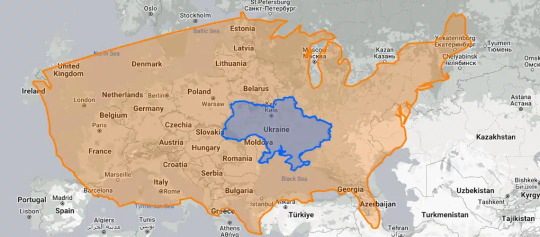
Ukraine is sometimes called “The Ukraine '' but that's controversial for reasons we will talk about later. So there are three main things that you need to know about Ukrainian history
First, Ukraine is famous for its fertile soil, the “Black Earth”, and is one of the major agricultural powers in the world, certainly it is the supreme agricultural powerhouse of Eastern Europe. This also makes it extremely valuable to other nations who might want to colonize it.
Second, Ukraine doesn’t have much in the way of Natural Borders. A Natural Border is a landscape feature which provides a convenient barrier between nations. A mountain range, a river, an ocean, or a desert are all good natural borders because it means that anybody who wants to invade you needs to really commit. While part of Ukraine is on the Black Sea and you have the Carpathian mountains in the west, the rest of it is…really not, it's mostly a mix of farmland and steppe.
Thirdly, this combination of fertile land and lack of natural defenses means that Ukraine has a long history of being invaded from almost every side, and one of the tricky legacies of this is figuring out where Ukraine stops and another country begins because The Commonwealth, Prussia, the Golden Hoard, Germany, Austria-Hungary, the Ottomans, and most infamously Russia have all had their shot at seizing Ukrainian territory. This is made worse because Ukraine is sort of in the middle of a bunch of other states, it connects between a bunch of territory. This is actually where the term “Ukraine” comes from, it means “borderland”
As a result of said fertility and constant invasion, Ukraine is an extremely ethnically diverse region, both in terms of Religion and Ethnicity. You have Ukranians, Russians, Tatars, Bulgarians, Jews, Hungarians, Romani and Pols living within the borders, with a lot of mixing between these groups.

So one final thing I want to talk about is Slavs, because I am going to be using that term a lot and it is good for non-Europeans to know what that means. Slavs is an ethnic/linguistic group that combines a wide variety of different ethnic groups, mostly linked through linguistic origin. A lot of ethno-nationalists will claim that there is some sort of magical bond all Slavs have towards each other by blood, but it’s mostly language connections, like how French and Italian are different languages but are clearly related. Slavic people’s include Czechs, Slavokians, Pols, Belarusians, Bulgarians, “Yugoslavians' ' (I am not going to get into the ethnic politics of the Balkans here, dear god no), Ukranians and ethnic Russians. Many slavic languages (but not all) use the Cyrillic script, which comes from the Byzantine Empire (We will come back to them later don’t worry), including both Ukrainian and Russian. What matters for us is that the Ukrainian and Russian languages are very closely related and are somewhat understandable to each other, there is even a dialect, Surzhyk, which mixes the two even further. A good comparison is like Spanish vs. Portuguese, different languages but very close. Why this matters is that many Russian nationalists claim that Ukranian isn’t actually a language, it's just a dialect of Russian. I’m not a linguist, but everything I’ve read indicates it is its own language, it has a few unique letters and UKraine has this weird case with words going on. The biggest evidence towards me though are Rusisans friends of mine who have told me that when they visit Ukraine they often have a very hard time understanding what is going on. Also worth noting, most Ukranians speak Russian, about a third of them speak Russian as their first language, mostly in the east. We will get on that later
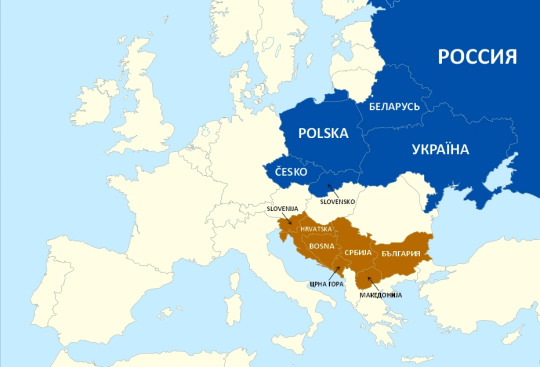
FInally, let's take a moment to talk about religion. Most Russians and Ukrainian are Orthodox Christians, aka “The Christianity people in the West forgets exists”. Short version is that before the Catholic Protestant Split in the 16th century, the previous sexy christian Split was in the 11th century between the Orthodox East and the Catholic West. Unlike the Reformation, this was less a doctrinal dispute and more of an organizational one, the Orthodox reject the Pope’s authority for the Byzantine Emperor, Catholics use latin as the liturgical language while the Orthodox used Greek, the Orthodox is a far more decentralized faith, they each have opposite signs of the cross, little things ike that. There have been…a lot of wars between these two groups and a lot of bad blood left over from said wars, such as the Fourth Crusade which sacked Constantinople or the Teutonic Knights (we will get to them more later.
Important for future events is the fate of the Byzantine Empire. Basically, when the Western Roman Empire Fell, the Eastern Empire continued on going until 1453, when it was finally destroyed by the Ottoman Empire. The Emperor was the head of the Orthodox church, so when the Empire fell, so too did the unity of the Orthodox church. Imagine if the Pope was killed, Rome was destroyed and no new pope was declared. So there isn’t one Orthodox CHurch, its several different Orthodox churches for each region.

#neglected historical fact#Ukraine#Russia#Orthidox Church#Borderlands#Natural Borders#russo ukrainian war#nationalism#“the Ukraine”#Campism#Tankies
4 notes
·
View notes
Text
Fascism tends to rely a lot on aethetic and simplistic kitch appeals to emotions, so it can seep into even anti fascists works if you aren't careful
what shits me up the wall about movies about fascist regimes – and I’ve complained about this many times and no doubt will again – is that it’s a visual medium so they can’t help making the fascists ugly.
this leads to the bizarre situation in which the evil of fascism rests on the presentation of them as ugly, old, fat, disabled, gender non-conforming, the men effeminate, the women mannish, lame legs, twisted arms, awkward scars, bad glasses, as if you can recognise their inhumanity by their appearance, while the heroic protagonists are… manly men and feminine women who look like movie stars, obviously.
that is fascism! that’s literally how you would construct fascist propaganda if you were trying to demonise a hated enemy regime! say that they’re bad while focusing on how ugly and threatening they look, it’s literally how people make political ads today.
now I know this is Hollywood so the protagonists are obliged to be hot, but if the visuals hinge on making the bad guys physically deformed then I don’t think the movie has the message that you think it does.
perhaps Starship Troopers was the only blockbuster movie to get fascism right, and as a result everybody just complained that it was stupid and the characters were annoying.
2K notes
·
View notes

